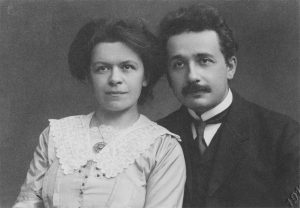Mileva Maric was a Serbian mathematician and physicist and Albert Einstein’s first wife. She was born on the 19th of December, 1875, into an affluent family in Austria-Hungary, modern-day Serbia.
Maric started her secondary education at a high school for girls in Novi Sad in 1886. However, in 1891, her father secured special permission for her to enter the all-male Royal Classical High School in Zagreb. She eventually passed and attained the highest grades in her class. In 1894, Maric intended to study medicine but later changed her mind. She then enrolled in a course to teach Mathematics and Physics at the Eidgenossische Technische Hochschule (Swiss Federal Institute of Technology). Interestingly, Maric was only the fifth woman to enroll in this distinguished school. Apart from this, she was the only woman in her course in a class of six students, where one of her classmates was Albert Einstein, her future husband.
In 1899, Maric took her intermediate diploma examinations. She attained a grade of 5.05, which means she placed fifth out of six students who took the examinations. Einstein, who took it the year before, attained a grade of 5.7. However, Maric failed to achieve a passing grade when she took the final teaching diploma examinations with an average grade of 4.00, with her mathematics component graded only at 2.5. Nonetheless, Maric was a groundbreaker in an era unquestionably dominated by men. Even in her early years, she had already started to overcome stereotypes and establish a new place for women in the field of science.
In May 1901, Maric was forced to stop her studies when she discovered she was pregnant by Einstein. While pregnant, she retook the examination, but she failed once more.
She headed to the city of Novi Sad, and this is where she gave birth to her daughter, whom the couple named Lieserl. Lieserl acquired scarlet fever and died when she was a year old. Other sources say Lieserl was adopted by a close friend of Maric’s, but the more widely-accepted version of events is the death of the child. Einstein’s mother did not like Maric, so the couple had to keep the child secret. Maric was not Jewish nor German, and this was one of the reasons Einstein’s mother disapproved of her. She was even quoted as saying, “She cannot enter a respectable family.” Another reason is that Maric was older than Einstein, prompting his mother to say in one of her letters to him, “By the time you’re 30, she’ll already be an old hag!” Albert’s father, too, was not very enthusiastic about the couple, expressing his wish that his son finds work first before entering family life.
Maric and Einstein eventually married each other in 1903 in Bern, Switzerland, and the following year, their first son was born, Hans Albert. It was during this time that Einstein was working as a patent clerk at the Federal Office for Intellectual Property. He worked there six days a week until 1909 when he obtained a lecturer’s post at the University of Zurich. Consequently, the family had to move. Then, in 1910, the couple’s second son, Eduard, was born.
Maric’s and Einstein’s marriage started to crumble in 1912 when Einstein’s cousin, Elsa Einstein, began to form a relationship with him. In July 1914, she took their sons to Zurich. This separation turned out to be permanent. Einstein and Maric reached an agreement that he would regularly send financial support. In 1919, the couple divorced, and Einstein married Elsa in the same year.
In 1921, Einstein was awarded the Nobel Prize. As part of the divorce settlement, his financial reward was secured in a trust for his two sons.
Over the decades, historians have discussed the extent to which Maric helped Einstein in developing his theories or if she helped him at all. Some sources say she only helped him with actual materials for research, while others say she only provided emotional support. Still, others entertain the possibility that she may have influenced him in some way when they were students.
The American physicist, John Stachel, points out the word “our” in Einstein’s letters to her. He said Einstein used the word only in an emotional sense, reminding her that he loved her and that they shared the same passion for the endeavor. He adds further that the word was never used in any specific scientific advances in the research. Moreover, Stachel says that in two letters where Einstein narrates his ideas to her, she did not reply. Instead, in her letters to him, she only wrote about personal affairs and never about heavy scientific matters.
However, some sources have a different view on the question. Maric’s brother, along with other relatives, recounted that Maric and Einstein talked about physics while they were married. Hans Albert, Maric and Einstein’s first son, gives an account that seems to support their relatives’ reports. He said he recalls seeing them every night working on a problem.
Maric died of a severe stroke on the 4th of August, 1948 at 72 years old. She was laid to rest at Nordheim-Cemetery in Zurich.
Her memory was honored in 2005 by the Eidgenossische Technische Hoschule and Gesellschaft zu Fraumünster. In the town of Titel, where she was born, a high school was named after her. Then, in 2009, a plate bearing her name was installed at the former clinic where she died.
Maric may forever be known as merely the first wife of Albert Einstein, but the great physicist seems, by all accounts, to have treated her as an intellectual equal. In a quote dated 1905, Einstein had these words for Maric: “For everything that I achieved in my life, I must thank Mileva. She is my genius inspirer, my protector against the hardships of life and science. Without her, my work would never have been started nor finished.”
